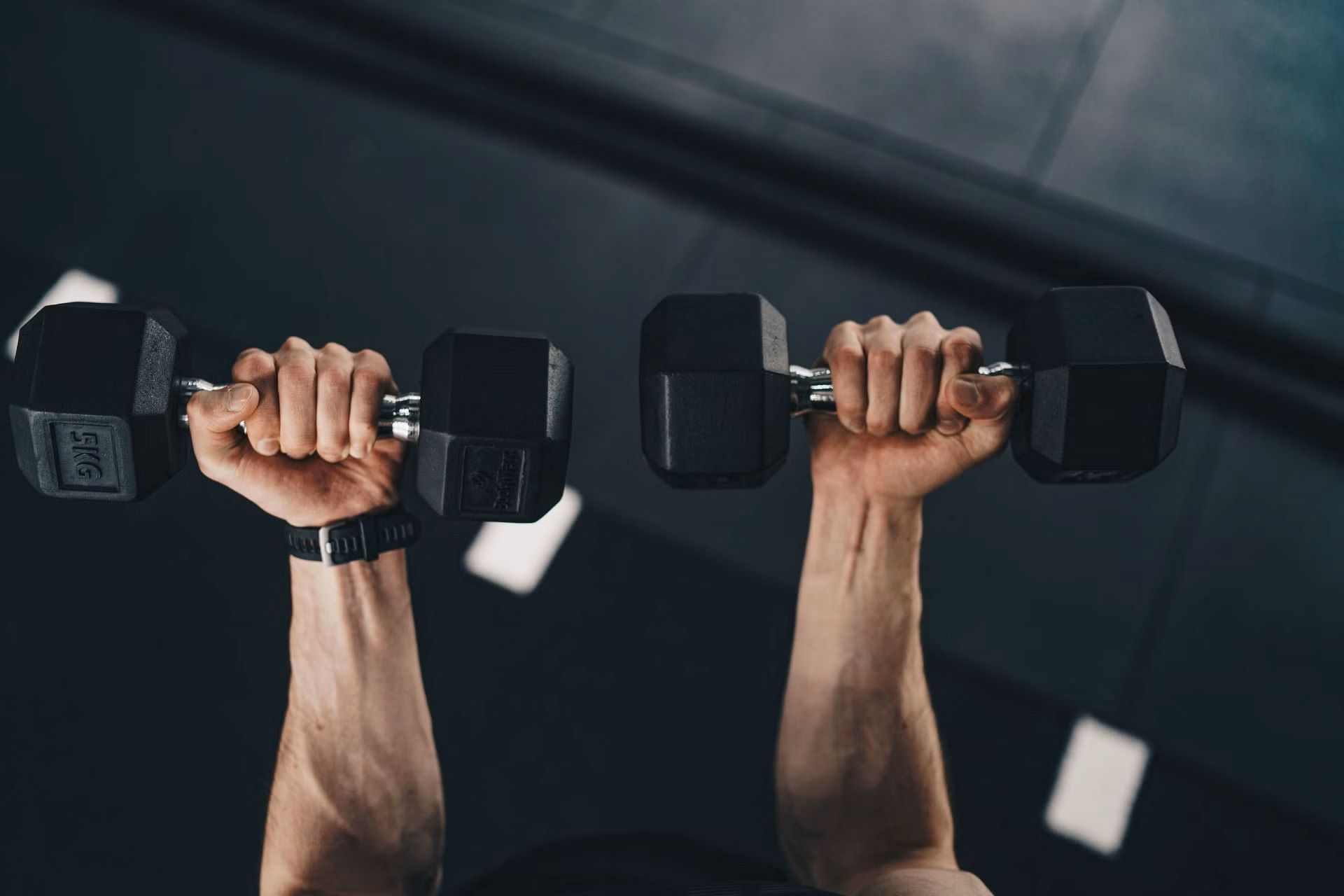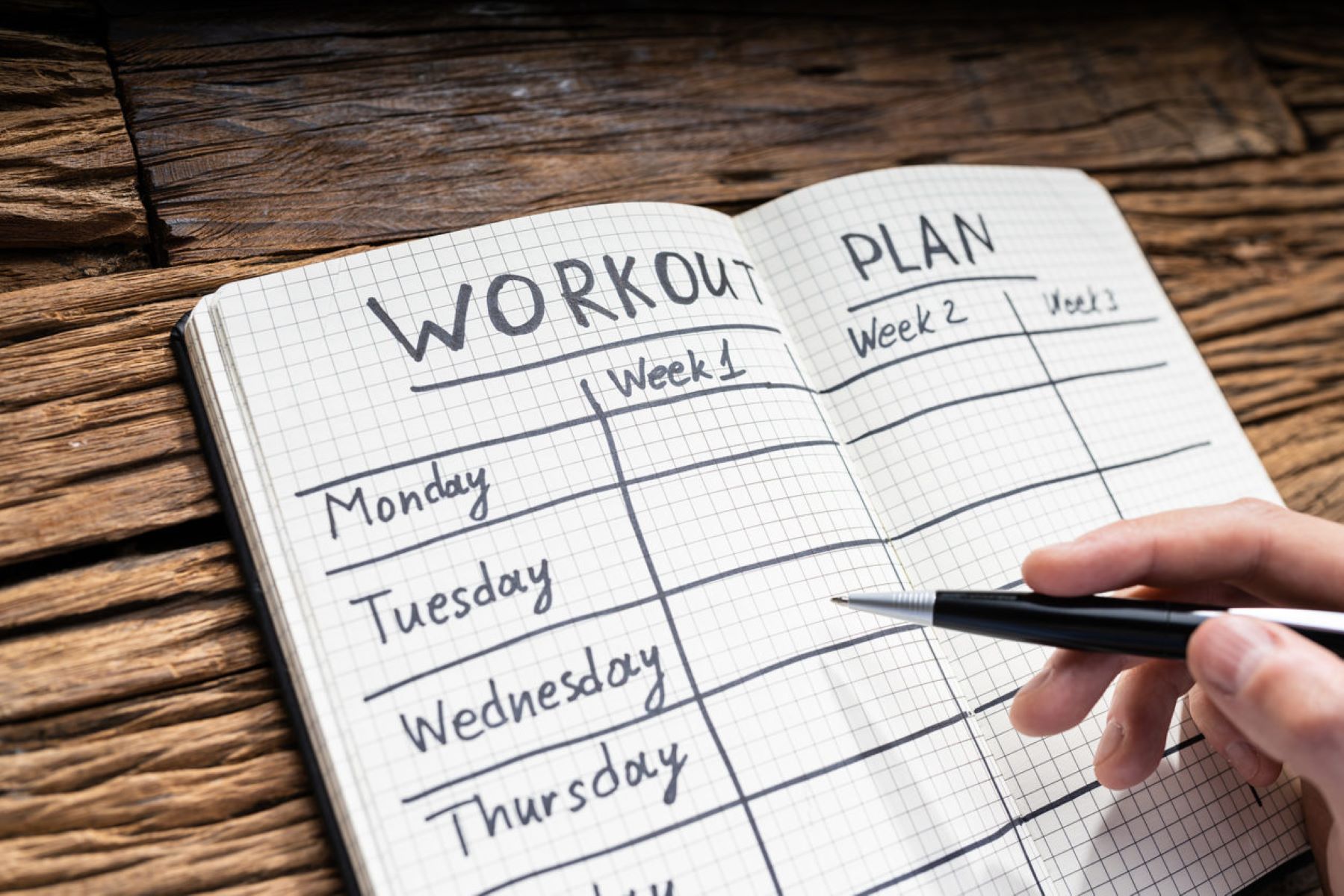

Featured
How Long After A Workout Do Muscles Grow
Modified: August 18, 2023
Discover how long it takes for muscles to grow after a workout and the secrets to maximizing your gains. Stay informed with our featured article.
Introduction
When it comes to working out, building muscle is a goal that many people strive for. Whether you’re a seasoned gym-goer or just starting your fitness journey, understanding the process of muscle growth is essential to achieve your desired results. It’s not just about lifting weights or doing intense workouts; it’s about understanding how your body responds and adapts to the stress placed on your muscles.
Muscle growth, also known as muscle hypertrophy, occurs when muscle fibers are stimulated and undergo repair and growth after exercise. This process involves a series of complex physiological changes that lead to an increase in muscle size and strength.
But how long does it take for muscles to grow after a workout? The answer is not as straightforward as you might think. It depends on various factors, including your individual genetics, workout intensity, nutrition, rest, and recovery.
In this article, we will delve deeper into the process of muscle growth and explore the factors that can affect how long it takes for your muscles to grow after a workout. We will also discuss the importance of post-workout recovery, muscle protein synthesis, and the role of nutrition and rest in optimizing muscle growth.
So, if you’re ready to unlock the secrets to maximizing your muscle growth potential, let’s dive right in!
The Process of Muscle Growth
Muscle growth is a complex and fascinating process that occurs in response to the stress and stimulus of resistance training. When you engage in weightlifting or any other form of resistance exercise, you cause tiny micro-tears in your muscle fibers. These micro-tears signal your body to initiate the repair and growth process.
After a workout, your body begins the process of muscle repair and regeneration. The damaged muscle fibers undergo various changes to adapt to the stress they were subjected to during the exercise. One crucial element of muscle growth is the remodeling of muscle protein structures, primarily myofibrillar proteins, which make up the contractile units of your muscles.
During the repair process, your body activates satellite cells, which are specialized cells that play a vital role in muscle regeneration. These cells fuse with existing muscle fibers and contribute to the repair and growth of the muscle. This process, known as muscle fiber hypertrophy, leads to an increase in muscle size and strength.
Additionally, the body’s response to muscle damage and inflammation triggers a cascade of signaling pathways that stimulate muscle protein synthesis (MPS). MPS is the process through which your body builds new muscle proteins, ultimately contributing to muscle growth.
It’s important to note that muscle growth is not a linear process. It occurs as a response to the cumulative stress placed on the muscles over time. Consistency is key in achieving long-term muscle growth. By consistently challenging your muscles through progressive overload and providing adequate recovery, you create the optimal environment for muscle hypertrophy.
Now that we have explored the process of muscle growth, let’s dive deeper into the factors that can affect how long it takes for your muscles to grow after a workout.
Factors Affecting Muscle Growth after a Workout
While the process of muscle growth is universal, the rate and extent to which muscles grow can vary from person to person. Several factors contribute to how long it takes for your muscles to grow after a workout. Understanding these factors can help you optimize your training and maximize your muscle growth potential.
1. Genetics: Your genetic makeup plays a significant role in determining your muscle-building potential. Some individuals naturally have a higher capacity for muscle growth due to their genetic predisposition. However, this does not mean that those with less favorable genetics cannot achieve impressive muscle gains. Everyone can improve their muscle size and strength with the right training and nutrition.
2. Workout Intensity: The intensity of your workouts directly impacts muscle growth. To stimulate muscle growth, you need to challenge your muscles beyond their comfort zone. This can be achieved by progressively increasing the resistance, volume, or intensity of your workouts. Higher-intensity training, such as heavy lifting and compound exercises, can lead to greater muscle fiber recruitment and stimulate more significant gains.
3. Nutrition: Proper nutrition is paramount for muscle growth. Consuming enough protein, carbohydrates, and healthy fats provides the building blocks and energy required for muscle repair and growth. Protein, in particular, is crucial for muscle protein synthesis. Aim to consume an adequate amount of protein from sources such as lean meats, dairy products, eggs, and plant-based proteins.
4. Rest and Recovery: Giving your muscles adequate time to recover is essential for muscle growth. During rest periods, muscle fibers repair and rebuild, leading to muscle hypertrophy. Overtraining or not allowing enough rest can hinder muscle growth and increase the risk of injury. Aim for 48 to 72 hours of rest between intense workouts targeting the same muscle group.
5. Hormonal Factors: Hormones play a pivotal role in muscle growth. Testosterone, growth hormone, and insulin-like growth factor-1 (IGF-1) are hormones that promote muscle protein synthesis and muscle hypertrophy. Adequate sleep, proper nutrition, and regular exercise can optimize hormone levels and support muscle growth.
By understanding these factors and how they influence muscle growth, you can tailor your training program and lifestyle habits to optimize muscle growth after a workout. Now, let’s explore the importance of post-workout recovery for muscle growth.
Post-Workout Recovery and Muscle Growth
Post-workout recovery plays a crucial role in maximizing muscle growth. While the actual workout stimulates muscle fibers and triggers the growth process, it is during the recovery phase that muscles repair, rebuild, and grow stronger. Here are some key aspects of post-workout recovery that can enhance muscle growth:
1. Rest and Sleep: Giving your muscles ample time to rest and recover is vital. It’s during this rest period that the body repairs damaged muscle fibers and adapts to the stress of the workout. Aim for 7-9 hours of quality sleep each night to optimize muscle recovery and growth.
2. Nutrition: Immediately after a workout, your muscles are primed to absorb nutrients. Consuming a combination of protein and carbohydrates within the first 30 minutes to an hour after your workout can maximize muscle protein synthesis and replenish glycogen stores. This can be achieved through a post-workout meal or a protein shake.
3. Hydration: Staying hydrated is crucial for muscle function and recovery. Water supports nutrient absorption, helps with muscle contractions, and aids in removing waste products from the body. Make sure to drink enough water before, during, and after your workouts.
4. Active Recovery: Engaging in light, low-impact activities such as walking, yoga, or stretching can enhance blood flow to the muscles and promote the removal of metabolic waste products. Active recovery can help reduce muscle soreness and improve overall recovery.
5. Foam Rolling and Massage: Using a foam roller or getting a massage can help alleviate muscle tension, improve circulation, and reduce post-workout soreness. Foam rolling can target specific muscle groups, aiding in their recovery and promoting flexibility.
By prioritizing post-workout recovery strategies, you provide the optimal environment for muscle growth. This allows your muscles to repair and grow stronger, leading to improved strength and size over time. Now, let’s move on to exploring the role of muscle protein synthesis in muscle growth.
Muscle Protein Synthesis
Muscle protein synthesis (MPS) is a critical process that drives muscle growth. It refers to the body’s ability to build new muscle proteins in response to the stimuli provided by resistance training and proper nutrition. Understanding how MPS works can help you optimize muscle growth after a workout.
During exercise, particularly resistance training, MPS is stimulated. The mechanical stress and muscle damage caused by intense exercise trigger a series of signaling pathways that activate MPS. This process involves the upregulation of various molecules and enzymes involved in protein synthesis.
One of the primary triggers for MPS is the interaction between resistance exercise and dietary protein intake. Consuming an adequate amount of protein, especially high-quality sources like lean meats, dairy products, and plant-based proteins, provides the essential amino acids needed for MPS to occur. Leucine, in particular, plays a significant role as a key regulator of MPS.
However, it’s important to note that the timing of protein consumption is also critical. Studies suggest that consuming protein within the post-workout window, typically within 2 hours after exercise, maximizes MPS. This is due to the heightened sensitivity and greater rate of protein synthesis during this time.
It’s worth mentioning that the total protein intake throughout the day is also important. Distributing protein intake evenly across meals can support a sustained elevation of MPS throughout the day, rather than relying solely on a single post-workout protein source.
Furthermore, the combination of protein and carbohydrates post-workout can have synergistic effects on MPS. Carbohydrates help stimulate insulin release, which promotes muscle glycogen storage and enhances protein synthesis.
By understanding the importance of MPS and the role of protein in supporting this process, you can optimize your post-workout nutrition to promote muscle growth. Now, let’s delve into the significance of rest and sleep for muscle growth.
Rest and Sleep for Muscle Growth
Rest and sleep are often overlooked aspects of muscle growth, but they are crucial for optimizing your results. While intense workouts and proper nutrition stimulate muscle growth, it is during periods of rest and sleep that your body actually repairs and builds new muscle tissue.
During exercise, you create micro-tears in your muscle fibers, and it is during rest that these tears are repaired and the muscles grow stronger. Without sufficient rest, your muscles don’t have the opportunity to recover and remodel, which can hinder muscle growth and increase the risk of overtraining.
Sleep is a particularly important aspect of rest for muscle growth. During deep sleep, the body releases growth hormone, which is essential for tissue repair and muscle growth. Sleep deprivation, on the other hand, can inhibit the release of growth hormone and reduce protein synthesis, adversely affecting muscle recovery and growth.
Aim to prioritize quality sleep by establishing a consistent sleep schedule and creating a sleep-friendly environment. Ensure your bedroom is cool, dark, and quiet, and limit screen time before bed to promote better sleep quality.
Additionally, incorporating rest days into your training routine is essential. Rest days give your muscles time to recover and adapt to the stress of previous workouts. It’s during this recovery period that muscle growth occurs, so make sure to schedule regular rest days and listen to your body’s signals for adequate rest.
Another effective strategy to optimize rest and recovery is incorporating active recovery days. These are low-intensity, low-impact activities such as walking, swimming, or yoga, which promote blood flow to the muscles and aid in their recovery. Active recovery can help reduce muscle soreness and improve overall performance in subsequent workouts.
By prioritizing rest and sleep, you give your muscles the time they need to repair and grow. This, combined with proper nutrition and targeted workouts, can enhance muscle growth and improve your overall fitness level. Now, let’s explore the role of nutrition in supporting muscle growth.
Nutrition and Muscle Growth
Nutrition is a key factor in supporting muscle growth and maximizing your workout results. Consuming the right balance of macronutrients and micronutrients provides your body with the necessary fuel and building blocks for muscle repair, recovery, and growth.
Protein is crucial for muscle growth as it provides the essential amino acids needed for muscle protein synthesis. Aim to consume an adequate amount of protein from sources such as lean meats, poultry, fish, eggs, dairy products, legumes, and plant-based proteins. According to research, consuming around 0.7 to 1 gram of protein per pound of body weight per day is optimal for muscle growth.
In addition to protein, carbohydrates play a vital role in muscle growth. They provide the energy needed for intense workouts and help replenish glycogen stores after exercise. Opt for complex carbohydrates like whole grains, fruits, vegetables, and legumes, which provide essential vitamins, fiber, and antioxidants.
Healthy fats also play a role in supporting muscle growth. They help with hormone production, nutrient absorption, and inflammation regulation. Include sources of healthy fats in your diet, such as avocados, nuts, seeds, olive oil, and fatty fish like salmon or sardines.
Timing your meals and snacks around your workouts can also support muscle growth. Consuming a balanced meal or snack containing protein and carbohydrates within an hour or two before and after exercise can provide the necessary nutrients for muscle repair and growth.
Hydration is another important aspect of nutrition for muscle growth. Staying hydrated supports optimal muscle function, nutrient absorption, and waste removal. Aim to drink enough water throughout the day, especially during and after workouts.
Lastly, consider incorporating supplements into your nutrition plan to support muscle growth. Protein powders, creatine, and branched-chain amino acids (BCAAs) are popular options that can enhance muscle recovery and improve performance. However, always consult with a healthcare professional before starting any supplement regimen.
By prioritizing proper nutrition, you provide your body with the necessary nutrients to support muscle growth and optimize your workout results. Now that we’ve explored the role of nutrition, let’s summarize the key points we’ve covered in this article.
Conclusion
Building muscle is a journey that requires dedication, proper training, and an understanding of the factors that contribute to muscle growth. Throughout this article, we’ve explored the process of muscle growth, factors affecting muscle growth after a workout, the importance of post-workout recovery and muscle protein synthesis, the role of rest and sleep, and the significance of nutrition in supporting muscle growth.
While the rate at which muscles grow varies from person to person, there are actionable steps you can take to optimize your results. Understanding your genetics, consistently challenging your muscles with intense workouts, prioritizing proper nutrition, and allowing adequate rest and sleep are all crucial components of maximizing muscle growth.
Additionally, paying attention to post-workout recovery strategies, such as consuming protein and carbohydrates, utilizing active recovery, and prioritizing quality sleep, can greatly enhance your muscle growth potential.
Remember, muscle growth is a dynamic process that takes time and consistency. It’s important to set realistic goals, track your progress, and make adjustments to your training and nutrition as needed. Stay committed, stay motivated, and enjoy the journey of sculpting your body and improving your overall fitness.
Now that you have a better understanding of how long it takes for muscles to grow after a workout and the factors that influence muscle growth, it’s time to put this knowledge into action. Keep pushing yourself, listening to your body, and adjusting your approach based on what works best for you. With patience, perseverance, and the right strategies, you can achieve the muscle growth results you desire.









